The Ebstein’s Anomaly Market is estimated to be valued at USD 16.2 billion in 2025 and is projected to reach USD 35.0 billion by 2035, registering a compound annual growth rate (CAGR) of 8.0% over the forecast period.
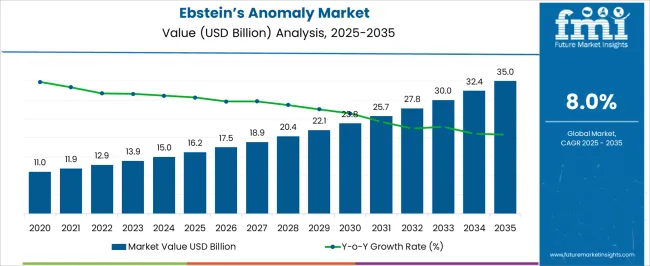
| Metric | Value |
|---|---|
| Ebstein’s Anomaly Market Estimated Value in (2025 E) | USD 16.2 billion |
| Ebstein’s Anomaly Market Forecast Value in (2035 F) | USD 35.0 billion |
| Forecast CAGR (2025 to 2035) | 8.0% |
The Ebstein’s Anomaly market is steadily expanding, driven by the rising prevalence of congenital heart defects and improved diagnostic and treatment capabilities. The current market landscape is characterized by a growing focus on early detection, advancements in surgical techniques, and the availability of specialized cardiac care across both developed and emerging regions.
Increased awareness among healthcare professionals and patients, combined with government and institutional efforts to improve congenital disease management, is contributing to greater patient identification and timely intervention. Institutional reports and clinical updates have highlighted a rise in research activities focused on rare congenital conditions, enabling the development of targeted therapies and personalized surgical approaches.
The future outlook remains promising as improvements in pediatric and adult congenital heart disease care, supported by enhanced healthcare infrastructure, continue to support long-term patient survival and quality of life With continued clinical innovation and multidisciplinary care strategies gaining traction, the Ebstein’s Anomaly market is expected to benefit from a more structured and evidence-based approach to diagnosis, treatment, and long-term follow-up care.
The market is segmented by Medical, Diagnosis, and End User and region. By Medical, the market is divided into Surgical Treatment and Diagnosis. In terms of Diagnosis, the market is classified into Echocardiogram, Electrocardiogram, Chest X-ray, Cardiac MRI, Holter Monitor, Pulse Oximetry, Exercise Stress Test, Electrophysiology Study, and Cardiac Catheterization. Based on End User, the market is segmented into Hospitals & Surgical Centres and Specialty Clinics. Regionally, the market is classified into North America, Latin America, Western Europe, Eastern Europe, Balkan & Baltic Countries, Russia & Belarus, Central Asia, East Asia, South Asia & Pacific, and the Middle East & Africa.
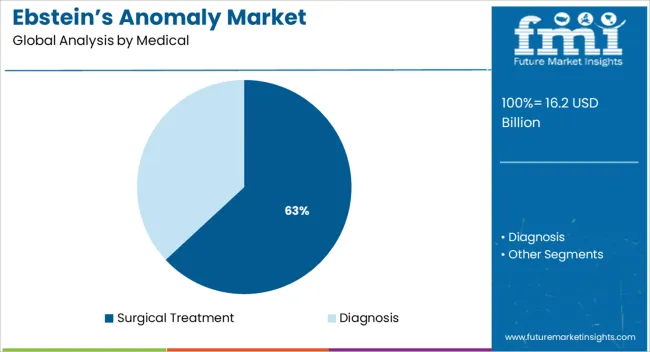
The surgical treatment segment is expected to account for 63.1% of the Ebstein’s Anomaly market revenue share in 2025, making it the dominant medical intervention. This dominance has been supported by the increasing need for structural correction in moderate to severe cases, particularly where valve dysfunction or heart failure symptoms are present. Reports from cardiac surgical associations and healthcare institutions have emphasized that surgical repair offers long-term benefits in terms of symptom relief and improved cardiac function.
The segment’s growth has also been encouraged by advancements in techniques such as tricuspid valve reconstruction and cone repair, which have shown improved patient outcomes. Clinical best practice guidelines increasingly recommend surgical intervention when medical therapy proves insufficient, further establishing the segment’s relevance.
Hospitals with congenital cardiac programs are enhancing their surgical capacities, and with improved access to specialized care and perioperative support, more patients are undergoing timely surgical correction These trends are expected to maintain the segment’s leadership in the treatment landscape of Ebstein’s Anomaly.
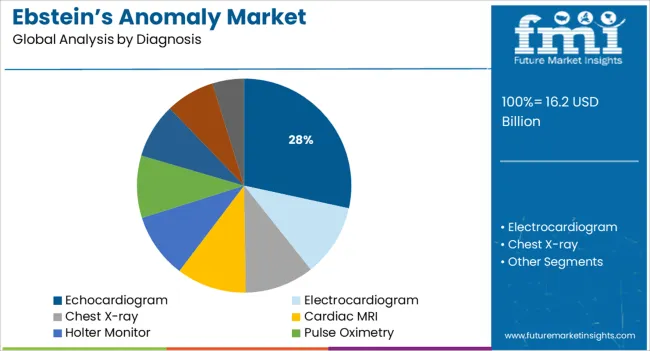
The echocardiogram segment is projected to hold 28.4% of the Ebstein’s Anomaly market revenue share in 2025, positioning it as the leading diagnostic approach. This leadership has been driven by the noninvasive, real-time imaging capability of echocardiography, which is considered essential in the initial diagnosis and follow-up of structural heart defects. Medical publications and cardiac society guidelines have consistently recognized echocardiograms as the primary diagnostic tool for evaluating tricuspid valve displacement and right ventricular function, key indicators of Ebstein’s Anomaly.
Portable and high-resolution imaging systems have expanded the use of echocardiography across primary and tertiary care settings, enhancing early detection. Pediatric cardiology departments rely heavily on this modality due to its safety and accessibility, particularly in neonatal and infant cases.
The segment’s growth has also been reinforced by technological advances in 3D echocardiography and Doppler imaging, which have improved diagnostic precision These factors collectively underscore the continued reliance on echocardiograms as the cornerstone of Ebstein’s Anomaly diagnosis.
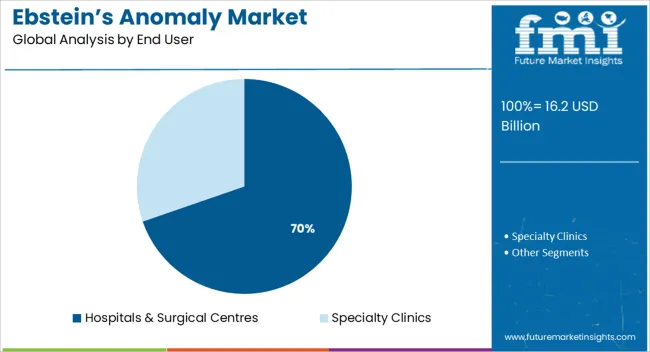
The hospitals and surgical centres segment is forecasted to contribute 69.7% of the Ebstein’s Anomaly market revenue share in 2025, maintaining its position as the dominant end user category. This leadership is attributed to the availability of specialized infrastructure, experienced multidisciplinary cardiac teams, and post-operative care services that are critical for managing complex congenital conditions. Institutional developments in congenital heart programs and pediatric cardiology departments have facilitated increased patient volume and improved surgical outcomes.
Access to advanced imaging, surgical suites, and intensive care support within hospitals and surgical centres has made them the preferred setting for both diagnosis and treatment. Leading institutions are also focusing on integrating lifelong care models, which further reinforces the segment’s relevance.
The growth of this segment has been strengthened by investments in high-volume surgical centers, particularly in regions with expanding tertiary healthcare facilities These drivers have ensured that hospitals and surgical centres remain central to the comprehensive management of Ebstein’s Anomaly.
According to market research and competitive intelligence provider Future Market Insights, the market for Ebstein’s anomaly reflected a value of 8% during the historical period, 2020 to 2025.
According to Cleveland Clinic, one in 200,000 babies is born with Epstein’s anomaly. With the world population increasing rapidly, the number of babies suffering from the ailment is expected to grow. Moreover, technological advancements and extensive research to manufacture medication for Epstein’s anomaly are expected to positively influence the demand for the market.
Thus, the market for Ebstein’s anomaly is expected to register a CAGR of 4.5% in the forecast period 2025 to 2035.
Genetic disorders and exposure to medications propelling cases of Epstein's anomaly market
Ebstein's anomaly is a rare congenital disease that occurs due to improper development of the tricuspid valve in the first eight weeks of fetal growth. This disorder occurs when the tricuspid valve that divides the two chambers of the right side of the heart does not form correctly.
Ebstein's anomaly may be due to many factors, including genetics and the environment. Children born in a family with a history of heart defects may be more likely to have Ebstein's anomaly. The mother's exposure to certain medications, such as lithium, can lead to Ebstein's anomaly in the child.
An increasing number of congenital diseases contributing to Epstein's anomaly market
The global Ebstein’s Anomaly market is driven by the increasing number of congenital heart diseases and the growing population; growing market players have increased the scope of Ebstein’s Anomaly market. Technological advancements, owing to which new and advanced products are being launched in the market, are another factor propelling the growth of this market.
Manufacturers of medication for Epstein’s anomaly are undertaking extensive research to form and produce medicines to treat or reduce the pain caused by the ailment. The integration of technology and knowledge is creating lucrative opportunities for the production of medication to treat ebstein’s anomaly.
Stringent regulatory frameworks for approval of medication hindering the market growth
The varied stringency of regulatory procedures across the globe and the presence of complex regulatory procedures may hinder the growth of this market. Moreover, the unavailability of correct medication and cause for the ailment is derailing the progress of the market. Furthermore, the lack of reasoning to produce medication that offers accurate results to treat ebstein’s anomaly is creating obstacles to the progress of the market.
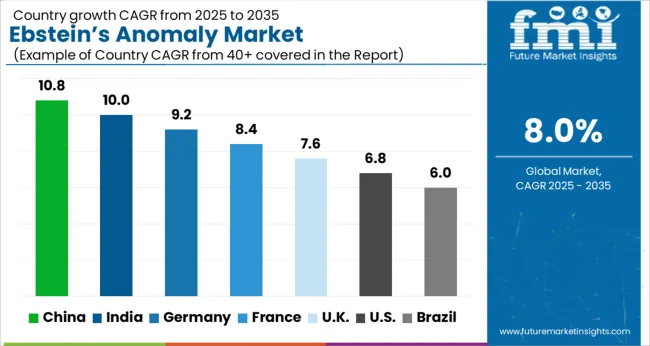
Availability of skilled professionals and advanced treatment boosting the market growth in North America
North America Ebstein’s Anomaly market is rapidly growing in the American region. On a regional basis, the Americas are segmented into North America and South America. North America is segmented into the USA and Canada. An increasing number of congenital disorders and a growing population have increased the scope of Ebstein’s Anomaly market in North America.
According to CDC (Centre for Disease Control), it was estimated that about 16.2 Billion USA children and about 16.2.4 Billion USA adults were living with CHDs. Additionally, CHDs affect nearly 16.2% of? or about 40,000?births per year in the United States. In addition, the skilled professionals and availability of advanced and accessible treatment facilities. Additionally, wide research and development activities for the treatment of rare diseases and increasing government funding boost market growth. Thus, North America is expected to possess a 40% market share for einstein’s anomaly market in 2025.
Increasing healthcare expenditure boosting the growth of Ebstein’s anomaly market in the Asia Pacific
Asia Pacific is expected to be the fastest-growing market. The increasing prevalence of chronic diseases such as diabetes is the major driver for market growth. India is the fastest growing region owing to the increasing population. Rising awareness about the health and availability of new treatment methods drive the market in this region. Rising healthcare expenditure and overall growth of the healthcare diagnostic and treatment industry also drive the market.
The presence and availability of specialty care centers in countries like China and Japan along with extensive research activities undertaken to treat the ailment are driving the growth of the overall einstein’s anomaly market in the Asia Pacific region. Thus, Asia Pacific is expected to possess a 35% market share for einstein’s anomaly market in 2025.
Precise results and ease of performing tests make echocardiogram a popular test option
On the basis of diagnosis Ebstein’s Anomaly market is segmented into echocardiogram, electrocardiogram (ECG) chest x-ray, cardiac MRI, Holter monitor, pulse oximetry, exercise stress test, electrophysiology study, and cardiac catheterization.
Echocardiogram has gained immense popularity owing to the accurate results it offers. The test uses sound waves to produce detailed images of the heart. Thus, it is a safer option to determine the presence of einstein’s anomaly in children. Furthermore, doctors too have recommended and favored the use of einstein’s anomaly owing to the ease of performing the test and the precise results it offers.
Thus, an echocardiogram is expected to possess a 33% market share for einstein’s anomaly market in 2025.
Favorable reimbursement policies make hospitals a viable option for treatment
On the basis of end users, the market is segmented into hospitals & surgical centers, and specialty clinics.
The hospital segment is expected to hold the largest market share for einstein’s anomaly. This is owing to the availability of various treatments and diagnostics in hospitals. In addition, the presence of healthcare experts and cardiologists is playing a key role in the wide usage of hospitals for the treatment of einstein’s anomaly.
In addition, initiatives by government authorities to support the treatment of einstein anomaly, especially in hospitals are favoring the growth of the same. Moreover, reimbursement schemes and their benefits are making hospitals a go-to option for the treatment of einstein’s anomaly. Thus, hospitals are expected to hold a 50% market share for einstein’s anomaly market in 2025.
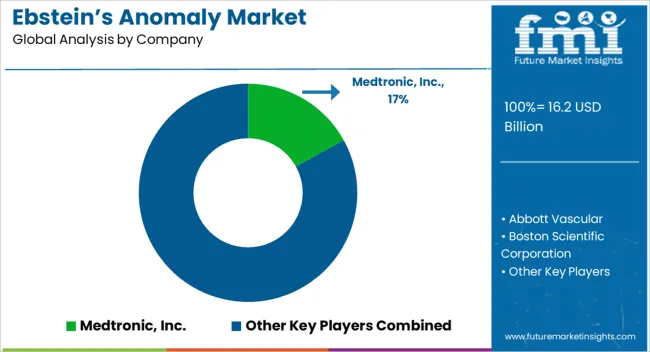
Some of the key players in Ebstein’s anomaly market are Abbott Vascular, Boston Scientific Corporation, Cordis Corporation, Edwards Lifesciences, Ge Healthcare, Gore Medical, Medtronic, Inc., and Numed, Inc among others.
| Report Attribute | Details |
|---|---|
| Market Value in 2025 | USD 16.2 billion |
| Market Value in 2035 | USD 35.0 billion |
| Growth Rate | CAGR of 8% from 2025 to 2035 |
| Base Year for Estimation | 2024 |
| Historical Data | 2020 to 2025 |
| Forecast Period | 2025 to 2035 |
| Quantitative Units | Revenue in USD Billion and CAGR from 2025 to 2035 |
| Report Coverage | Revenue Forecast, Volume Forecast, Company Ranking, Competitive Landscape, Growth Factors, Trends, and Pricing Analysis |
| Segments Covered | Treatment, Diagnosis, End User, Region |
| Regions Covered | North America; Latin America; Western Europe; Eastern Europe; Asia Pacific Excluding Japan; Japan; Middle East and Africa (MEA) |
| Key Countries Profiled | The USA, Canada, Brazil, Argentina, Germany, The UK, France, Spain, Italy, Nordics, BENELUX, Australia & New Zealand, China, India, Association of Southeast Asian Nations, GCC, South Africa |
| Key Companies Profiled | Abbott Vascular; Boston Scientific Corporation; Cordis Corporation; Edwards Lifesciences; Ge Healthcare; Gore Medical; Medtronic, Inc.,; Numed, Inc. |
| Customization | Available Upon Request |
The global ebstein’s anomaly market is estimated to be valued at USD 16.2 billion in 2025.
The market size for the ebstein’s anomaly market is projected to reach USD 35.0 billion by 2035.
The ebstein’s anomaly market is expected to grow at a 8.0% CAGR between 2025 and 2035.
The key product types in ebstein’s anomaly market are surgical treatment, _tricuspid valve repair, _tricuspid valve replacement, _closure of the atrial septal defect, _maze procedure and diagnosis.
In terms of diagnosis, echocardiogram segment to command 28.4% share in the ebstein’s anomaly market in 2025.






Full Research Suite comprises of:
Market outlook & trends analysis
Interviews & case studies
Strategic recommendations
Vendor profiles & capabilities analysis
5-year forecasts
8 regions and 60+ country-level data splits
Market segment data splits
12 months of continuous data updates
DELIVERED AS:
PDF EXCEL ONLINE
Anomaly Detection Tools Market

Thank you!
You will receive an email from our Business Development Manager. Please be sure to check your SPAM/JUNK folder too.
Chat With
MaRIA